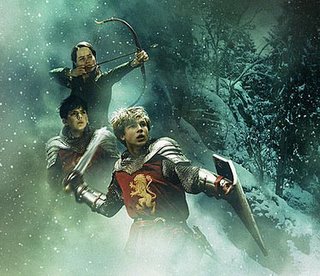 Preceded by hundreds of articles, one children’s book, and much anticipation, The Chronicles of Narnia, produced by Andrew Adamson, brought a 55 year old classic to life. The book was written by C.S. Lewis, who is famous for numerous Christian books, most notably, Mere Christianity.
Preceded by hundreds of articles, one children’s book, and much anticipation, The Chronicles of Narnia, produced by Andrew Adamson, brought a 55 year old classic to life. The book was written by C.S. Lewis, who is famous for numerous Christian books, most notably, Mere Christianity.
The story begins when the four Pevensie children are sent to the country to escape the German Blitz in London during World War II. The four children, Peter (played by William Moseley), Susan (played by Anna Popplewell), Edmund (played by Skandar Keynes), and Lucy (played by Georgie Henley), discover another kingdom inside an old wardrobe. During their encounters with various creatures, the children learn that this kingdom, Narnia, is ruled by an evil witch who causes it to always be winter and never Christmas. Following Edmund’s betrayal of his siblings, the children are led to Aslan, a lion, the Christ figure in the story. The witch’s demands cause Aslan to give the ultimate sacrifice to spare Edmund and ultimately save Narnia.
Currently grossing an estimated $67.1 million dollars, The Chronicles of Narnia truly brings its audience a glorious movie. I have divided my movie review into three sections: differences between the book and movie that don’t affect the book’s message, differences that negatively affect the story, and my general impression.
Although the book humorously portrays Mr. and Mrs. Beaver as having amusing little spats, the producers of the movie took it one step further. Humorous lines are spattered throughout the film, including some sarcasm, and a memorable line just before the great battle. Addressing Peter’s comment about the size of the Witch’s army, a centaur says, “Numbers do not win the battle.”
“No, but I’m sure they help,” says Peter, provoking laughter from the audience. Little moments like that don’t detract from the movie’s message by overshadowing the story.
For those who have been avid Narnia fans for years (this includes those who have read the book more than ten times), they will notice minor differences between the dialogue in the movie and the dialogue in the book. One missing line in particular caught my family’s attention. In the book after all the children discover Narnia, Peter says to Edmund, “Why you poisonous little beast!”
The movie lacks the biting zest of that particular line. These minor dialogue changes don’t change the perceived intent of the text. The movie producers also added an entire ice chase scene, not a choice I would have made, but not a change that harms the movie.
I did notice three major areas where the movie producers changed or added material that I believe negatively affected the original story. The first, although it could be classified by some as a minor difference, felt very significant and memorable to me. When the Pevensie children dine with the beavers in the book, they enjoy a spectacular meal with fresh trout, potatoes, plenty of butter, and “a gloriously sticky marmalade roll.” These victuals are sadly missing in the movie, where Lucy crinkles her nose at what looks like burnt fish with their skins on and something that looked like scorched chicken feed.
The movie producers created the impression that the Pevensie children thought about returning home, as opposed to their obvious duty to stay and take their places on the four thrones at Cair Paravel. Susan whines that this battle is not their fight, and that it’s too dangerous. Peter almost takes the children back to the wardrobe.
I can’t help wondering if the movie producers were trying to relay a message about pulling out of Iraq. In any case, the ‘cut and run’ thread that runs through a part of the movie plays no part in the book. C.S. Lewis made in clear that once Edmund was in danger and the situation was fully explained, the Pevensie children had no question about their duty to stay, save their brother, and fulfill the old Narnian prophesy at Cair Paravel.
The final area where the producers took undue liberties with the book is in regard to Aslan. In the movie, Aslan says at one point, “I will do what I can.” There seems to be an attitude that Aslan isn’t in charge, and can’t handle what’s going on. He’s not enough. This flouts the intent of the book, where Aslan portrays the Christ figure.
The producers redeem themselves at the end of the movie however, because the Pevensie children do decide to stay and do their duty, Aslan does save the day and redeem Edmund, and as World Magazine put it, “Aslan's fearsome roar is still powerful enough to be heard over the din.”
Aside from these differences, good and bad, I thoroughly enjoyed the movie. As I watched the movie unfold, it seemed just like I remembered from the book. I believe this speaks of the excellent job that C.S. Lewis did in portraying the story, as well as the producer’s efforts to remain faithful to the story.
Unlike some movies I’ve watched, The Chronicles of Narnia completely captured my interest, and I found myself so caught up in the story that I jumped when Maugrim, head of the witch’s secret police, snarled at Edmund. I often find myself disappointed at a producer’s choice in actors because I have imagined the book characters differently, but the four children were represented almost perfectly.
The Chronicles of Narnia truly is a masterpiece, and definitely worth paying to see in the theatre. Besides being an enjoyable story, it reminds us anew of Christ’s sacrifice.
Monday, December 12, 2005
Chronicles of Narnia movie review *SPOILER WARNING*
Posted by
the traveler
at
5:02 PM
![]()
Subscribe to:
Post Comments (Atom)

No comments:
Post a Comment